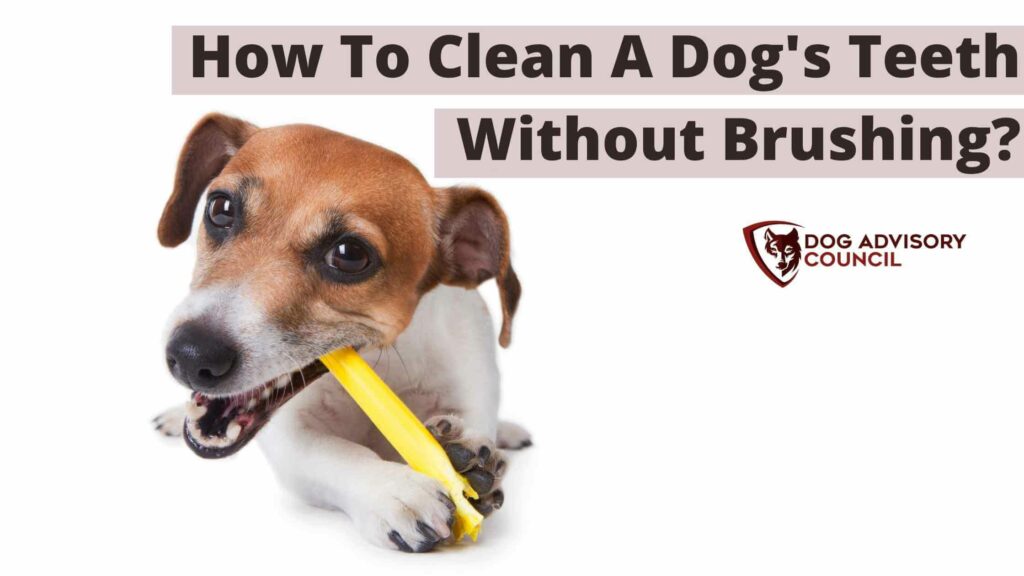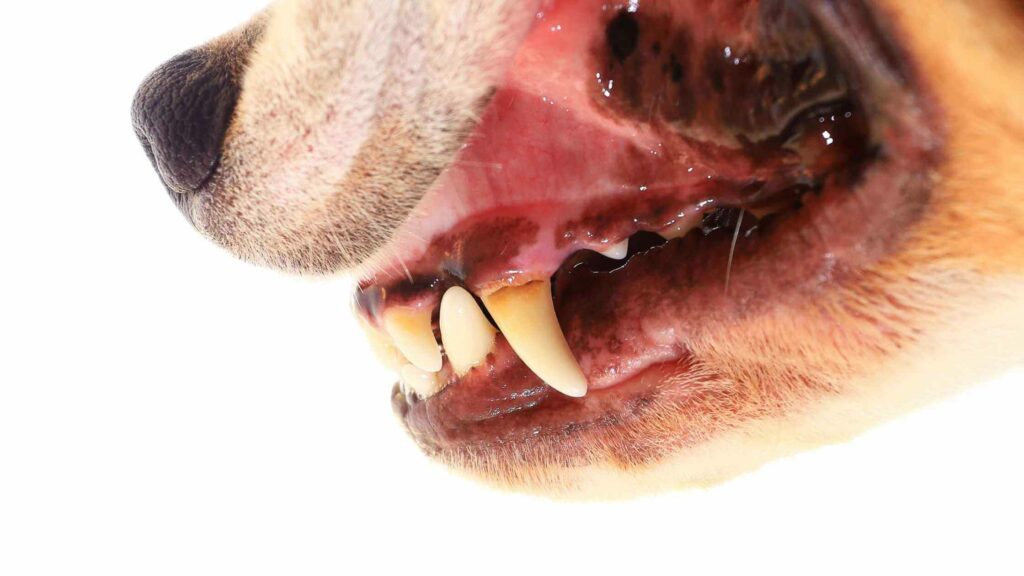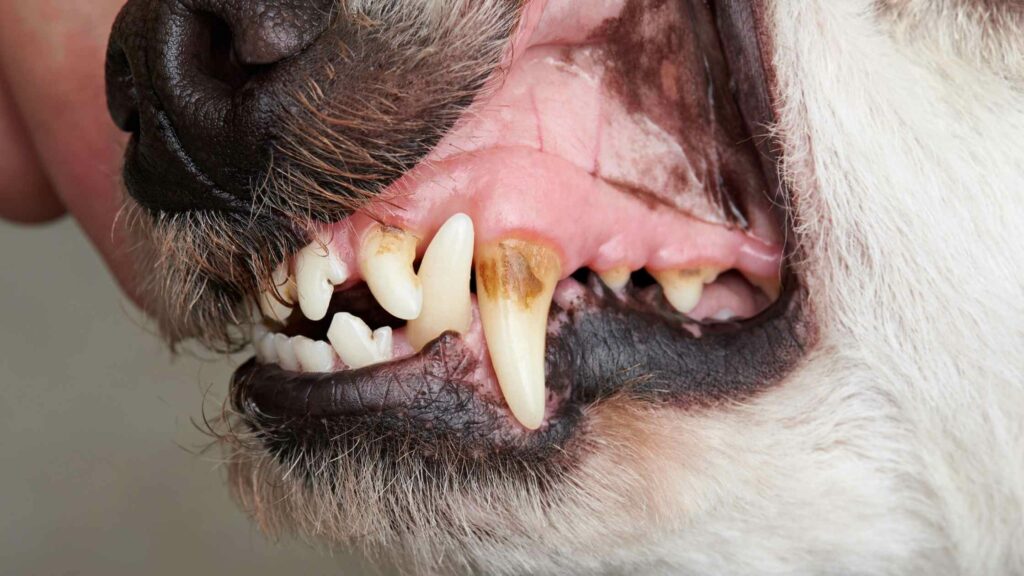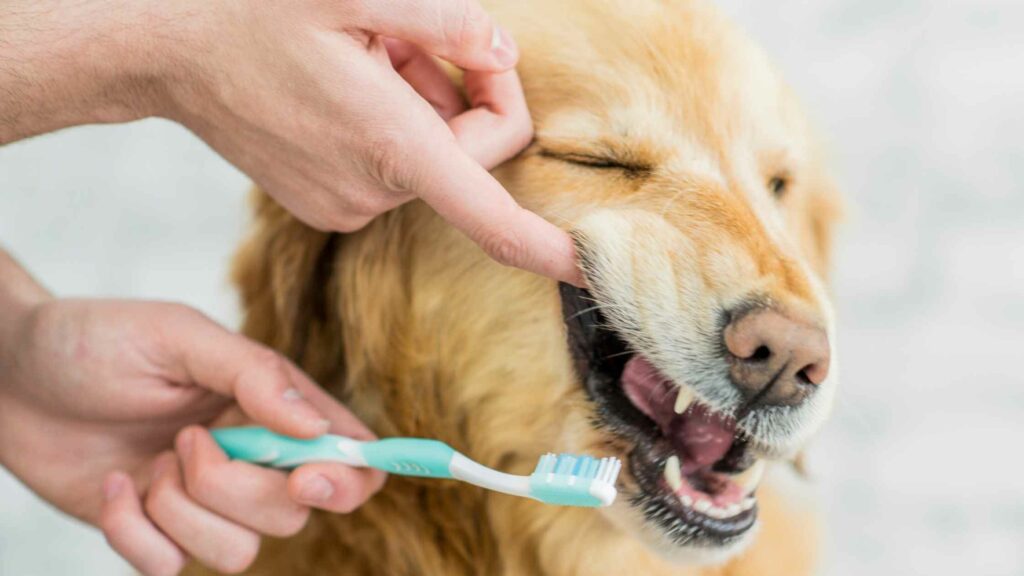
If you love your dog but can’t stand the thought of brushing their teeth to protect their dental hygiene, there are other things you can think about for their best health and protection. In this article, we’re going to talk about how to clean dog teeth without brushing.
You can effectively clean your dog’s teeth without having to take on brushing your dog’s teeth yourself. Top options include:
- Using a cloth
- Getting specialized chew toys
- Giving them specialized dry food
- Giving them veggies
- Investing in dental treats
- Using a spray
- Using food additives
Curious how it all works? There’s more detail waiting for you on each of these important categories below!
How to clean a dog’s teeth without touching a toothbrush
As introduced above, there are some great techniques you can use when looking at taking care of your dog’s dental health. Here they are again, in more detail:
- Using a cloth
- Getting specialized chew toys
- Giving them specialized dry food
- Giving them veggies
- Investing in dental treats
- Using a spray
- Using food additives
Using a cloth
Many pet parents may find that the simple work of handling a toothbrush and trying to move it around their mouth is the hard part. So, you can try using a cloth and wrapping it around your finger for better and easier movement. You can also try purpose-designed wipes to clean your dog’s teeth.
If your dog doesn’t like the toothpaste, you can try a natural toothpaste by looking up vet-approved dog toothpaste recipes online or going with other natural options that offer the same cleaning power.
Getting specialized chew toys
If you want to avoid sticking your finger in their mouth, too, you’ll enjoy the option of specialized chew toys. These durable rubber toys have carefully designed ridges and grooves that your dog will chew on. These ridges will effectively clean their teeth, and your dog will enjoy a fun chew session at the same time.
Giving them specialized dry food
There are now diets specifically designed to help your dog clean their teeth. This kind of dry kibble has larger pieces that will help wipe your dog’s teeth clean, and they also include ingredients that will help your dog’s mouth be cleaner as they chew the food and kibble itself. This kind of food is most commonly available at a vet’s office.
As you probably already know, specialized food like this is expensive, but your dog’s health is worth it, and it also helps your dog enjoy a cleaner mouth!
Giving them veggies
Dogs need their veggies just the same as children do! Well, sort of. You can feed small amounts of raw carrots and apples to dogs. Both of these will help clean your dog’s teeth and offer an impressive diet that will help them enjoy a cleaner mouth with some extra nutrition along the way!
Investing in dental treats
Just as there are specialized diets for food, there are also specialized treats that your dog can enjoy that will do double duty of cleaning their teeth. Dentastix and Greenies are great examples of this. They’ll entertain your dog but simultaneously offer a fresh, healthy, clean smile! These are also wonderful when your dog loves the idea of chewing on these treats while they are home alone!
Using a spray
If you love the idea of the wipes or specialized products like that, you can also try a spray. This is a carefully formulated aerosol spray that you can spritz into your dog’s mouth, and it’ll work hard to clean their mouth, teeth, and gums. This is as specialized and purpose-designed as the wipes we mentioned above, but there is no direct contact needed!
Using food additives
We talked briefly about carrots and apples. You can add these to your dog’s diet a few times a week by adding them literally to their bowl of kibble. This helps them ingest them in proper portions, and they’ll be more incentivized to eat their kibble, too.
You can also try coconut oil if you want another option other than veggies. Coconut oil is a potent antibacterial and is highly regarded as a miracle product. It’ll help by killing the bacteria that causes plaque in your dog’s mouth.
Similarly, you can also try water additives. You can add these liquid products to their water bowl, and your dog will lap it up and enjoy fresh breath and a clean mouth when they rehydrate after their walk!

Do dogs really need their teeth cleaned?
We know why you’re asking this question. After all, it’s a lot of work to clean your dog’s teeth, and it’s frustrating to make time for it on top of all your other dog duties. However, cleaning your dog’s teeth really is important. Dental hygiene often gets overlooked, but, as we’ll go into below, it can be a severe health risk down the road! Find a way to clean your dog’s teeth that you can do regularly and easily!
How can I clean my dog’s teeth naturally?
You can try some natural options to clean your dog’s teeth if you want to avoid manmade products like wipes, sprays, and toothpaste. Whether your dog has allergies or you just want to stay natural, it’s perfectly understandable and doable!
Your best natural products start with natural food additives such as vegetables, fruits, or coconut oil. They’re simple and cost-effective to add to their food several times a week and will do a fantastic job at cleaning your dog’s teeth.
If you want something simpler, you can also consider the idea of those specialized chew toys with ridges and grooves. This is a wonderful option for dogs that love to chew, too, since it makes their habit much more useful and keeps them occupied!
What foods clean a dog’s teeth?
As we already discussed above, coconut oil, carrots, and apples are wonderful options to help clean your dog’s teeth. Remember that all these human foods should be in small servings and will offer great benefits if used several times a week.
You can use these together or choose the one that your dog likes best. You still will want to try the chew toy products or others for a literal approach to dental health for your dog.
Do carrots clean a dog’s teeth?
Yes, carrots do actually clean your dog’s teeth. The texture of raw carrots is good for removing plaque, but the active ingredients in carrots will also clean your dog’s teeth. Carrots also have some great general health benefits for dogs, so they’re a wonderful choice!
Does peanut butter clean a dog’s teeth?
Dogs may love peanut butter, but it’s not an effective option for cleaning their teeth. Some think that the peanut butter helps remove plaque, but little research supports that. Peanut butter’s main benefit is that it promotes saliva production in your dog, which can help remove some build-up in their mouths.
Do apples clean a dog’s teeth?
Apples do well at cleaning your dog’s teeth! They have a lot of acids that will help remove plaque and weaken tartar for easier removal by other methods. The texture of the apple is also a great surface cleaner for your dog’s mouth. The acid is also thought to kill off many bacteria that cause bad breath and plaque.
Remember that too much acid can impact your dog’s sensitive stomach, so you’ll want to stick to small amounts of apples for the best health benefit and lowest health risk.
Can I use baking soda to clean my dog’s teeth?
Baking soda is seen as a miracle product for cleaning your dog’s teeth, but there’s no research that it does anything to help your dog’s teeth. Baking soda also tastes awful, so it can turn your dog off of anything to do with brushing their teeth for the future. Lastly, baking soda can upset their sensitive stomachs. So, there’s no true benefit to using baking soda to clean your dog’s teeth and many risks!
Can you remove dog plaque at home?
You can certainly remove plaque from your dog’s mouth at home; you don’t need to have a professional cleaning done. You can choose any of the methods above, but you’ll find the most effective method for on-demand plaque removal will still be brushing or using contact methods such as wipes or a cloth.

How can I remove thick plaque from my dog’s teeth?
Thick plaque can build up, particularly around the gum line, if you aren’t quite as timely as you should be. If you want to remove that kind of plaque at home. In that case, you’ll want to rely on acidic products like apple slices combined with contact methods like wipes and water additives. It’ll take a multi-faceted approach to effectively remove thick plaque from your dog’s teeth.
How can I get plaque off my dog’s teeth without brushing?
If you’re sure that contact method, even wipes, won’t work, then you’ll want to try the apples and water additives with a dental diet and those chew toys. The more details that you put into place to clean your dog’s teeth and mouth, the better attack angle you’ll get on the plaque!
The dental diet kibble is also good for long-term health since it’s intended for daily use for your dog and will help prevent build-up!
What is the best plaque remover for dogs?
The best choice for removing plaque, as far as a product, is going to depend on whether you want to go with natural or unnatural ingredients. For an all-natural approach, you will want to consider coconut oil. It’s easy to add to their food and will help kill the bacteria that cause plaque in the first place.
If you’re okay with some unnatural ingredients, you’ll find those dental chews like Dentastix or Greenies to be a great choice to help really get your dog’s teeth cleaned!
There’s no rule that you can’t do both, either! You can use whatever combination best works for you and your dog!
Can I scrape tartar off my dog’s teeth?
Manually scraping tartar off your dog’s teeth is not a good idea. It can be painful and distressing, not to mention damaging to their teeth. You’ll want to use wipes or chew toys for a contact-based approach to plaque removal.
You can consider taking them to a doggy dentist for professional cleaning if you want to! This will be similar to what a human would get done, though a dog needs to be put under anesthesia in order to have it completed.
Will coconut oil remove tartar from a dog’s teeth?
Coconut oil might be a wonderful and seemingly magical product, but it isn’t a cure-all. Coconut oil doesn’t actively remove tartar from a dog’s teeth. It works by killing off the bacteria, as we talked about. You can use coconut oil, but you can’t expect it to break down the build-up that is already on your dog’s teeth!
What happens if I don’t brush my dog’s teeth?
If you’re feeling a little overwhelmed by all this information, you might be tempted to skip the entire brushing process of your dog’s teeth. It’s not the end of the world, right? Wrong.
Proper dental hygiene is essential for a dog’s health, and if you don’t regularly brush their teeth, you’ll leave them at risk for gum disease and dental decay, amongst other complications. These can lead to pain in the mouth, which means difficulty eating, and this can lead to malnutrition, poor quality of life, and so on.
The most terrifying health risk, however, is that poor dental health can lead to infection in the gum. This infection can quickly spread with you none the wiser, and it can — and has, in the past — lead to death for your dog if it’s not caught and treated in time.
Not only will regular teeth cleanings help you to keep their mouth clean and healthy, but they’ll also give you ample opportunity to spot a brewing infection as soon as possible. This can give you time to intervene!

How often should a dog’s teeth be cleaned?
You’ll want to aim for 2-3 times a week unless your vet tells you otherwise. It’s a good idea to introduce teeth cleanings as early in their life as possible so that it becomes just another part of their routine instead of something that they dread.
What is the black stuff on my dog’s teeth?
If you see black gunk on your dog’s teeth, it’s most likely a thick layer of plaque. It can discolor over time with saliva and panting. However, it can be signs of an infection, so you’ll certainly want to get it checked out by a vet. This is especially likely if you notice your dog having difficulty eating or otherwise seeming to be in pain.
What can I use as a substitute for a dog toothpaste?
If you don’t like to use traditional toothpaste for your dog, you can use coconut oil. You can apply this to cloth if you want or add it to their diet through their kibble. Both ways will give your dog the same benefits for their oral hygiene and general health.
How can I freshen my dog’s breath?
If you notice that our dog has foul breath, which is common, then the best way to help with that is through a water additive. They’ll drink throughout the day, and this will continuously freshen their breath! You can also look at changing their diet if it’s something in their food that could be causing bad breath!
How do a dog’s teeth stay white?
Dogs can have pearly whites just like us humans! As you can probably guess, the way to do that is going to be regularly cleaning and opting for your dog’s best oral hygiene and dental health.
What fruit is good for a dog’s teeth?
Apples are the best option for a dog’s teeth, as you have already learned. You can feed them other citrus fruits in small amounts, but apples tend to go over well because dogs enjoy their flavor more than, say, a slice of lemon!
What is the difference between plaque and tartar in dogs?
Plaque and tartar both cause problems for a dog’s overall dental health. Tartar is the hard, stubborn build-up that needs to be taken off your dog’s death with contact-based approaches, much like humans require. Plaque is the softer, gummy build-up on a daily basis that can be removed with a proper diet and other methods we’ve talked about above!
Do Dentastix actually work?
Yes! These are great products for dogs that love treats and love to chew because they really do help give your dog better dental health and also freshen their breath! You can find a few flavors, too, if your dog is particular.
Do Greenies actually work?
Yes, these are also very effective products for your dogs to enjoy a treat that also does double duty in cleaning their mouth!
What does it cost to clean a dog’s teeth?
If you’re still thinking about the idea of having your dog’s teeth professionally cleaned, you may be surprised to learn that it can cost up to $700 for this service. Since dogs have to be put under anesthesia, this adds to the amount for the actual cleaning itself. It is a great idea to consider if you want to know that their teeth are truly clean at least once a year, but the cost is significant enough that you’ll want to think about it!
How much does it cost to remove tartar from a dog’s teeth?
Removing tartar is the same process as cleaning your dog’s teeth, so it’ll be the same amount. Doggy dentists will do all of those things in the same procedure, so you can rest assured that your dog will have a great dental bill of health after the appointment. If the only thing that you want to do is remove some build-up. In that case, you may find that the at-home options are going to be cost-effective, and the professional cleaning can wait until you see serious build-up.
In conclusion
If you want to clean your dog’s teeth without necessarily reaching for the toothbrush, you can focus on other options, including a cloth, wipe, or aerosol spray; diet changes such as specialized food or treats; and even human foods options such as fruits, vegetables, or coconut oil. You can also consider a professional dog dentist visit for true, all-access cleaning.
Who knew there was so much to understand about brushing your dog’s teeth, right? If you want to help those around you understand it, too, share this with them!
